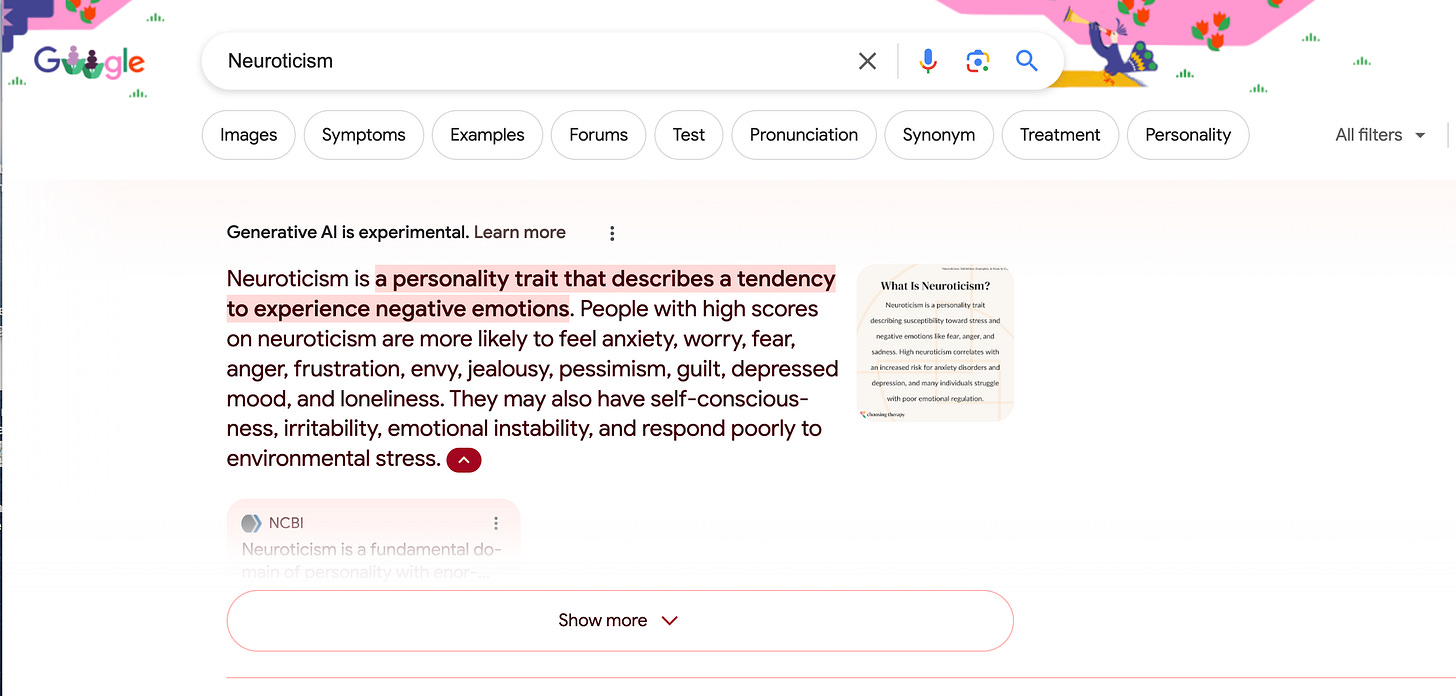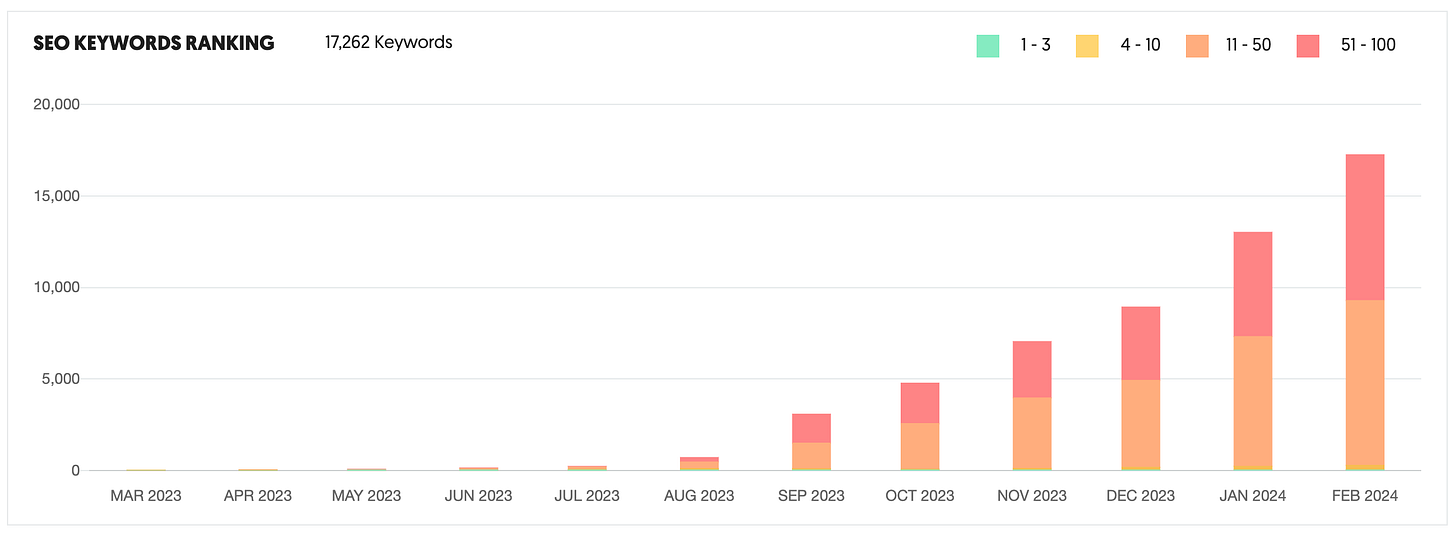I Published 500+ AI Articles & This at What Happened
How I Created an AI Content Machine
Over the past year, I have been running a number of experiments in AI, ranging from creating Knowledge Bases to playing around with conversation-first website experiences and finally testing AI-generated content.
Finally, I am ready to share the results of another one of my experiments.
This experiment is relevant to any company or person who creates online content.
In our experiment, we created over 500 AI-generated articles and published over a Million words in 6 months.
In some sense, we built an AI Content Machine, a process that empowers anyone to scale content creation in a way that adds value.
Below, I am sharing how we did it and what happened. For those who want to go deeper, I am providing a full tutorial (for paid subscribers) that outlines the exact steps.
Without further ado, let’s begin.
The Experiment: Creating an AI Content Machine
The Goal
My primary goal was to find out if using AI to generate traffic is a viable strategy and if so, what is the best way to go about it.
Specifically, I wanted to know how this type of content would perform in a highly competitive but very personal niche.
This niche focuses on people who want to learn about themselves, but they don't necessarily want to do it via AI-generated content, which is perceived as artificial, robotic, and cold.
So, if AI Content can succeed here, then it can succeed just about anywhere!
The Challenges
Like any project, there are challenges we must solve for.
These challenges included creating a relevant SEO plan simple enough for my assistant to execute and structured so that we would see results in about six months.
Lastly, there was an issue with the domain and Google's sandbox.
Generally, ranking anything within the first few months is tough, and we had to figure out a way to hack the Domain Authority.
Having a solid foundation here would speed up the time, and it would let me know if I am on the right track.
The Strategy
Did you know that Google uses AI and NLP to understand and rank content?
This is an emerging trend, and soon Search Engines will do this for everything we write.
The Internet will become akin to a vast Knowledge Base, and the Search Engine will rank content and use a process similar to RAG to fetch it.
And… to this point…
This has already begun.
Google has launched Search Generative Experiences (SGE), which answer users' questions directly on the SERP!
This means that websites are treated like domain-specific Knowledge Bases.
Thus, organizing our information into proper taxonomies and ontologies would make the website RAG-ready, optimized for Google (SGE), and would allow us to make it conversational!
So, to get started, I focused on the following:
Topical Authority: No one would care if you wrote one GREAT article on Personality but if you wrote 500 good articles on Personality, then you have topical authority. The Goal was to build out all of the most relevant content for the niche and cover it in 'depth' and 'breadth'.
Taxonomy: We want to structure and organize the content in hierarchies that show the proper hierarchical relationship between our entities. This makes it easier for Search Engines to understand and find content on our site.
e.g., Bloody Mary (entity) is a type of Cocktail (category)
Ontologies: By creating links between concepts, classes, rules, restrictions, properties, actions, and relationships we can provide additional insight and value.
(e.g., Bloody Mary (entity) contains Vodka, Tomato juice, lemon, and garnishments)
Semantics: In our content, we explicitly defined key terms and gave them context and clear meaning making it easy to reference and understand.
Here is an example of a Taxonomy on the Left and a set of Ontologies on the right:
Do you want to see how we implemented this SEO Strategy?
» Later in this article, in the How We Did it Section Below I will share the details on how we created our Topical Map and our overall SEO strategy and used Semantics to Rank! «
Implementation: Here is What we Did
After creating the SEO Strategy and Topical Map, I made a content plan.
Phase 1
The focus here was the publishing of the foundational content related to Personality.
Articles Published: ~100
Content: Personality Traits, Types, Tests, Theories, Frameworks, Definitions, Characteristics, etc...
Focus: definitions, meaning, semantics, ontologies
Naturally, most of this content is at the top of the hierarchy and very difficult to rank for. Yet, it is necessary for our Topical Map and to satisfy user expectations.
Phase 2
Personality is one of those topics that connect with everything. In Phase 2, we started directly relating personality characteristics to the contents of our lives.
Articles Published: ~400+
Content: Personality & Compatibility, Personality & Relationships, Personality & Jobs, etc
Focus: rank and expand the topic
Here, we focused on content that could rank on Google while filling out our Topical Map and sending link juice to articles above it in the hierarchy.
Total Articles Published: ~500
Total Words: ~1,000,000
The Results: Here is What Happened
The majority of the traffic was via SEO. We didn't promote this on Social Media or other methods, which has been shown to impact SEO.
Traffic
Traffic Summary:
August 7: Traffic 0
August 8: Traffic 23
March 13: ~275/day Organic Traffic
Growth Rate
→ Total Growth Rate: 1095.65%
→ Monthly Growth Rate: 156%
This may sound like little, but this type of growth, compounding at 156% per month over 12 months, jumps to 1,713,732 monthly visitors. This example puts the lofty growth rate into perspective.
→ Forward Projects: 3mo = 31,320 | 6mo = 118K | 1yr = 1.7M
Current Monthly Traffic
→ Est March SEO Traffic: 8,250 - 10,000/month
Now, let’s get an idea of the keyword ranking.
Rankings
Within 7 months, we were able to rank over 17,000 Keywords, increase our Domain Authority to 41, and have over 3,700 backlinks.
The growth is steady. Each month, we rank for more KW as we publish additional content.
Domain Authority
We were able to completely solve the Domain Authority challenge and jump out to a score above 41.
This made it possible to grow organically.
Right now, all of the backlinks we are gaining are natural. We haven’t even spent 5 minutes building out backlinks.
And many of the sites that refer to us are very high quality.
Referring Domain
The Guardian
TED
Business Insider
INC
Entrepreneur
Bustle
ASK.com
» Now, we were able to solve the Domain Authority challenge, which made much of this possible.
If you want to know how we did it, you are in luck!
I will share how we increased our Domain Authority in the How We Did It Section. «
Takeaways & Next Tests
Overall, we were able to grow traffic using AI-generated content.
For the first five months, we ranked only for the lowest-competition keyword phrases, but in the last 30 days, we have started to rank for more competitive keyword phrases.
This is only one part of the journey to determine if this strategy is viable. We still need to find out the following:
Can we use this traffic to build a relationship with the user?
Is this type of traffic valuable?
Can we turn this traffic into leads and sales?
Next Tests
Increasing Time on Site
Increasing #of Pages Viewed
Increasing return users
Increase % of Leads Generated
Building out a Conversational Website
Tutorial: How we did it
Now, I will share how we did much of this, the tools and strategies we used, and which you can implement.
Topics:
Hacking Domain Authority
Semantic SEO: Topical Map & Content Plan & Structure of Articles
Team & Task Organization & Scaling
Tools: AI Writing and SEO Tools
Hacking Domain Authority
What if I told you there was an easy, effective, and straightforward way to increase your Domain Authority and gain thousands of high-quality backlinks?
Would you be interested?
What if this way is something that companies like Google and Amazon do all of the time, and in many cases, you can gain free content, instant rankings, and live traffic?
Are you even more interested?
Great! Here is how we did it.











